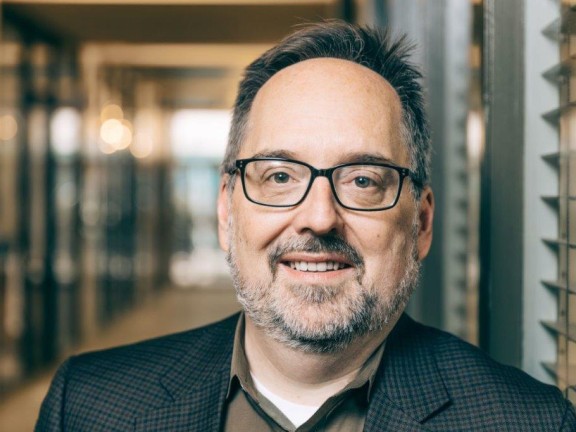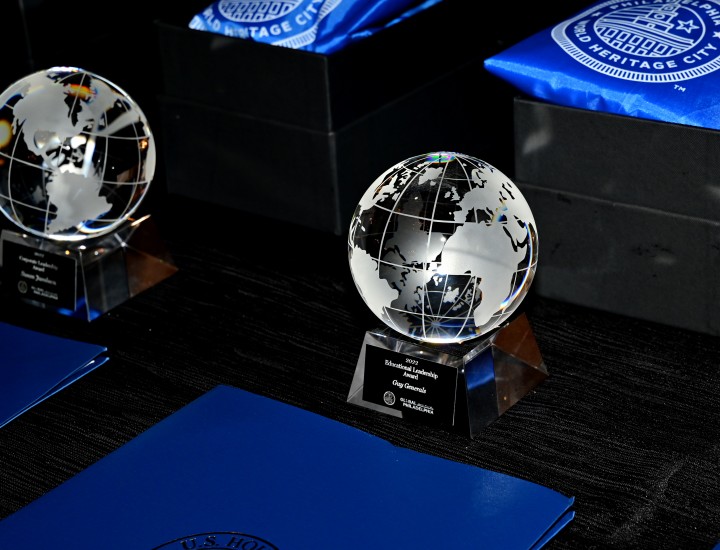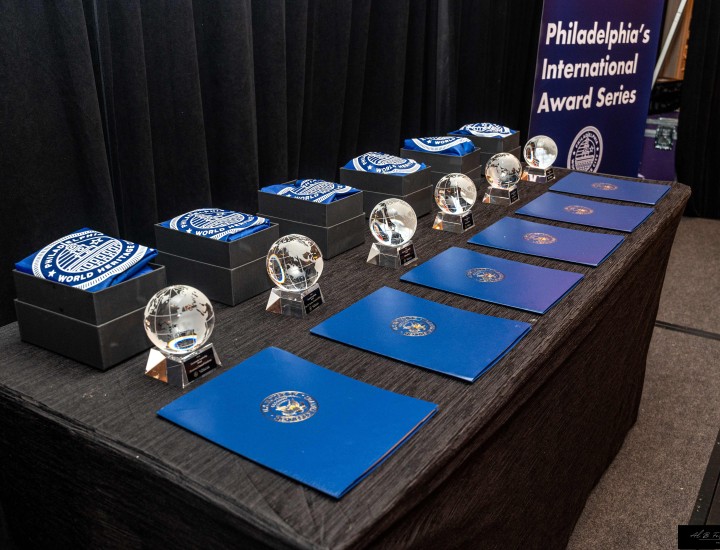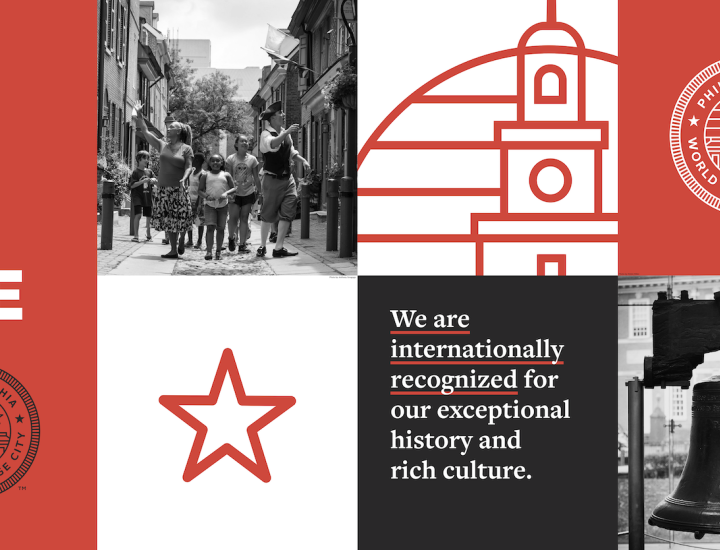A Global Conversation with Michael Norris

Michael Norris has been the Executive Director of the Carpenters’ Company of the City and County of Philadelphia since 2019. GPA is awarding Norris with the Heritage Leadership Globy Award for his work in this organization and his management of Carpenters’ Hall, which is a National Historic Landmark in Philadelphia’s historic district and home to the Carpenters’ Company.
Norris’ professional career began in editing and publishing after he graduated from Temple University with a Bachelor of Arts in Journalism. He soon transitioned to the nonprofit sector, holding leadership positions at various art institutions, such as Philadelphia’s Walnut Street Theatre, the Arden Theatre Company, and Art-Reach. Before joining the Carpenters’ Company, he was Vice President of External Relations and Chief Strategy Officer at the Greater Philadelphia Cultural Alliance. His background shows a deep investment in Philadelphia’s culture and a propensity for leading, collaborating, and advocating for communities.
Through Norris’ efforts, the Carpenters’ Company has been revitalized and become more active in civic engagement and public education. To highlight his efforts, GPA interviewed Norris to get insight into his passions and career.
Madi Costigan: Your background highlights involvement in journalism, the arts, and culture. How did these fields become of interest to you?
Michael Norris: I always loved to read as a kid and I always knew that writing was something that I was good at. Using communication skills seemed like a good thing for me to do as a career, so that’s how I got into journalism and publishing. Then in my mid-20s I was a little burnt out from that so I thought, ‘let’s do something that’s good for the world and still uses my skills.’ That’s when I transitioned into nonprofit. That felt like a really good place for me in terms of my own interests and inclinations toward service and giving back.
The arts were kind of random when I first started looking for jobs; I was applying at arts organizations and human service organizations. I was just focused on being in a role that allowed me to use my communication skills for something that was making the world a better place in some way, or at least Philadelphia. I happened to be hired by an arts organization, and of course, when you're in your 20’s, stuff happens and you don't know that it will end up becoming a huge part of your life and that’s what happened. When I started working in arts and culture it was so rewarding and there's such a wonderful community here that it just clicked and I knew it was where I should be.
You are receiving the Globy Award for Heritage Leadership. Can you describe your connection to Philadelphia and its heritage?
I’ve lived in Philadelphia for a long time, since I was a freshman in college, and I’ve always been interested in buildings, architecture, and urban planning in cities. I grew up in a very small town, so when I came to Philadelphia, that was pretty transformational for me. I am intrigued by and challenged by the issues of urban living in terms of infrastructure but also culture and diversity, all of those things that make a city so wonderful and vibrant. I always appreciated that about all cities, but certainly for Philadelphia as the place where I landed, it became of particular interest for me to understand and appreciate it in a pretty deep way.
Now working in the nonprofit sector, how has historical and cultural heritage become important to you personally?
I certainly feel like history and heritage are a part of the broader cultural community, so I don’t see that as a huge diversion from what I had been doing. Again, it just clicked on a bunch of levels. I’ve always been a big amateur history buff. I was the dorky kid who spent his paper money buying books about Andrew Jackson or the New Deal when I was in high school because I loved history. To me, it’s really an amplification and continuation of that and I don't think of it as a big change. Much of the work is very similar in terms of programming, working with board members, and fundraising. What I like about it is that it is grounded in a physical place that's very real and very specific, so there is a sense of clarity or focus that comes with that that is good.
Can you describe why it is important for Philadelphians to recognize the city’s cultural and historical heritage?
I’m so involved in it- it’s maybe hard to have some objectivity. But for me, it feels like it is just utterly essential to understanding how the city operates and how we all collectively work together to fix problems and understand the path and use that knowledge to make the place better. All of that feels very interwoven to me and I think Philadelphia speaks to that in a way because it is so inherently diverse that that brings out those nuances of culture, whether its food culture or the environment, all of that gives Philadelphia a uniqueness and a vibrancy. A lot of us are focused on history and the past, but the real value of that is what does that mean now? How do we use that to make the city better and make people more engaged as citizens?
In terms of bringing that appreciation into the present day, and delving more into your role in the Carpenters’ Company, how are you bringing a historical space and company into the present and continuing that work?
During the pandemic, our board did some strategic planning and soul searching. We are on the cusp of some major anniversaries and there was a real interest in figuring out how to articulate the vision for the organization that would guide us through the anniversaries but also set a course for us into the future. Where we landed was that we want the history of the site and what happened here to be a way to inspire our visitors and audiences to be more engaged as audiences and citizens. So, that is how we have been framing the work in terms of programming, and that can be through things like voter registration drives on site.
We have had discussions about how architecture does or does not reflect democratic values, so that framework has been the platform that we have trained a lot of our work around. I think that also ties into one of the core challenges of history organizations: this notion of relevance and why anyone should care about stuff that happened 250 years ago. Having that lens that is specifically about connecting that past to today allows you to make the case that we are in fact relevant and there are things we can learn and do or not do based on our history.
The Carpenters’ Company and GPA are often partners in events and initiatives. How do the Carpenters’ Company and GPA’s educational efforts and recognition of World Heritage align with each other?
I was fortunate enough to go to Quebec last year and be part of the Philadelphia delegation to the meeting of the OWHC. Most of our direct work with GPA has been through the NHL consortium, the National Historic Landmarks, and GPA has been an aggregator or organizer of all the NHLs in Philadelphia. So, we hosted a meeting of that group here, we have participated in the World Monuments Day events that happen in April that GPA organizes, and of course, I've been to a number of GPA events over the years.
The international aspect of Philadelphia is really important, I feel like we already have so many different communities here, of immigrants and folks from other parts of the world and both currently, and long traditions of those folks living here and being represented here. I think the idea of Philadelphia as a World Heritage City feels right in a lot of ways. Because it honors the impact that the city has had on a global scale in terms of being the birthplace of American democracy but it also fits well into what we are as a city, which is a place that has lots of people from all over.
Philadelphia and the Carpenters’ Company have some big anniversaries coming up, with the semiquincentennial approaching and the 300th anniversary of the organization coming next year. What plans do you have for these events?
We have two anniversaries next year in 2024. One is the 300th anniversary of the company itself and the other one is the 250th anniversary of the first Continental Congress which took place in the fall of 1774. And while that Congress did not result in the Declaration of Independence, it really did pave the way for it by creating an association and a sense of unity among the colonies to develop a collective strategy to address their grievances with England. And one of the outcomes of the first Continental Congress was the decision to have a second Continental Congress, which did result in the Declaration of Independence, so the two events are linked for sure. But our primary focus is on next year with the 250th anniversary of the Continental Congress.
We have a whole year-long program of events and activities; the biggest one is a student congress that we’re organizing, called the Young People's Continental Congress, in which high school students and their teachers will come to Philadelphia, both next summer in 2024 and the following summer in 2025, to have their own congress. They will be learning about the history of what happened here, but we also really want them to think about today as future leaders and future voters and citizens. What is on their mind about what needs to be better and improved in the way our government works or the way our country works?
It's really a great mash up of history and civics that leverages what Philadelphia has to offer both in terms of historical collections and resources, but also wonderful educational opportunities. We are working with all the other historic sites and museums in this district to coordinate that program, so it will be a really wonderful opportunity for students that we hope will put them on a course toward deeper civic engagement.


